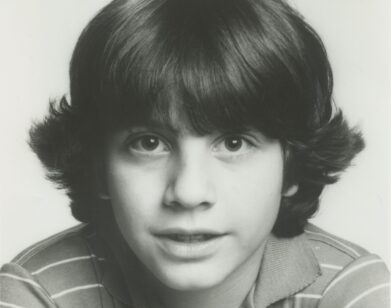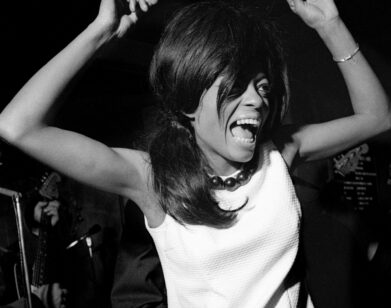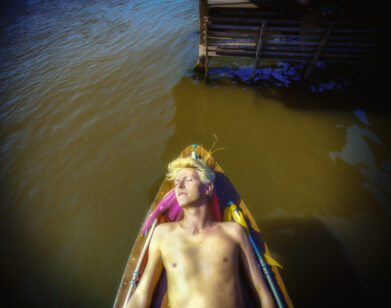Sophia Loren Doesn’t Believe in Being a Star
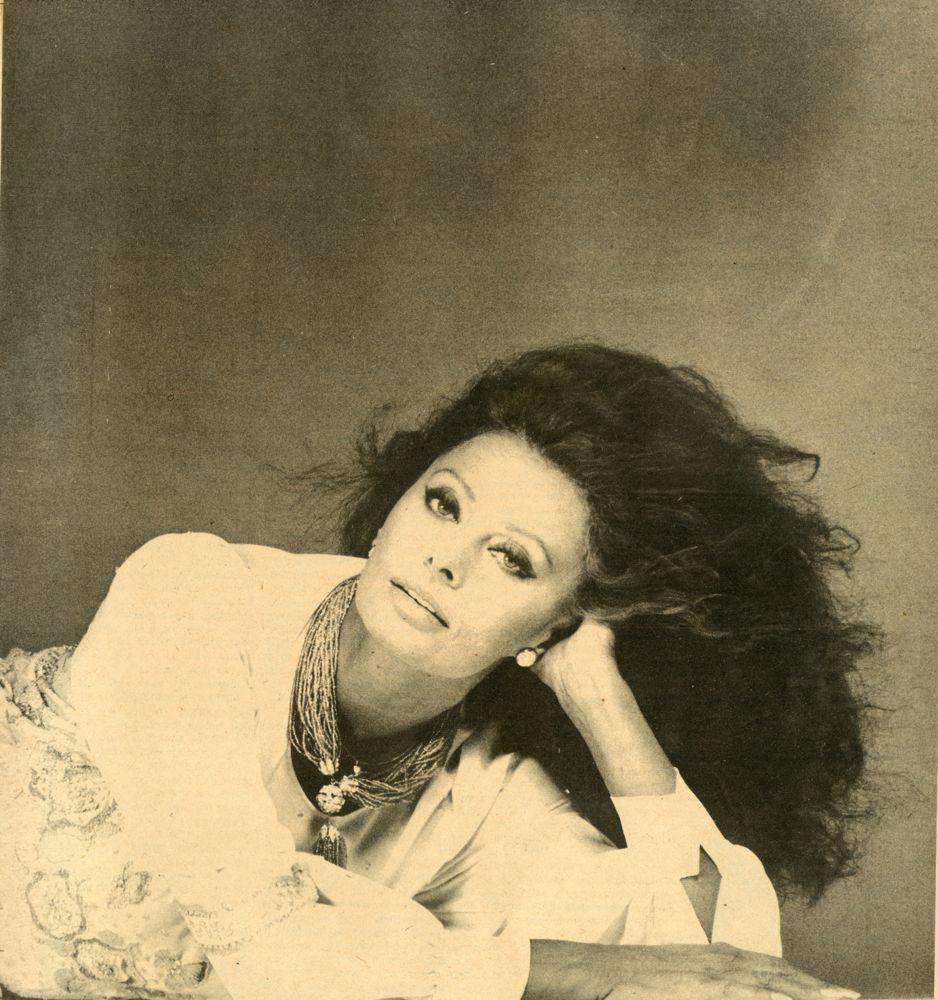
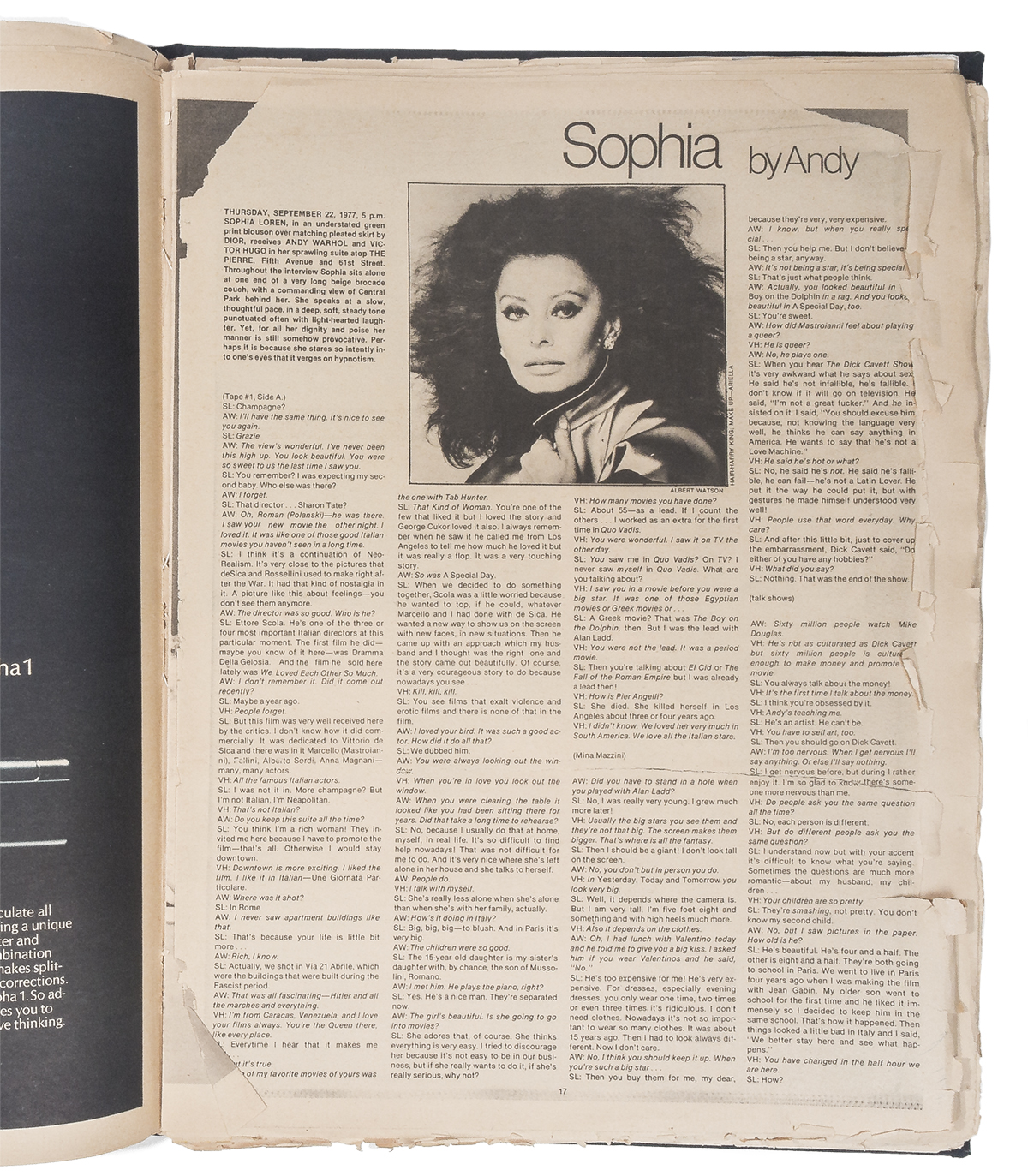
This story is part of a collection celebrating the best—and wildest—Warhol conversations from the Interview archives.
Sophia Loren, in an understated greed print blouson over matching pleated skirt by Dior, receives Andy Warhol and Victor Hugo in her sprawling suite atop the Pierre, Fifth Avenue and 61st Street. Throughout the interview Sophia sits alone at one end of a very long beige brocade couch, with a commanding view of Central Park behind her. She speaks at a slow, thoughtful pace, in a deep, soft, steady tone punctuated often with light-hearted laughter. Yet, for all her dignity and poise, her manner is still somehow provocative. Perhaps it is because she stars so intently in one’s eyes that it verges on hypnotism.
———
SOPHIA LOREN: Champagne?
ANDY WARHOL: I’ll have the same thing. It’s nice to see you again.
LOREN: Grazie.
WARHOL: The view’s wonderful. I’ve never been this high up. You look beautiful. You were so sweet to us the last time I saw you.
LOREN: You remember? I was expecting my second baby. Who else was there?
WARHOL: I forget.
LOREN: That director…Sharon Tate?
WARHOL: Oh, Roman [Polanski]—he was there. I saw your new movie the other night. I loved it. It was like one of those good Italian movies you haven’t seen in a long time.
LOREN: I think it’s a continuation of Neo-Realism. It’s very close to the pictures that de Sica and Rossellini used to make right after the War. It had that kind of nostalgia in it. A picture like this about feelings—you don’t see them anymore.
WARHOL: The director was so good. Who is he?
LOREN: Ettore Scola. He’s one of the three or four most important Italian directors at this particular moment. The first film he did—maybe you know of it here—was Dramma della gelosia (1970). And the film he sold here latest was We All Loved Each Other So Much (1974).
WARHOL: I don’t remember it. Did it come out recently?
LOREN: Maybe a year ago.
VICTOR HUGO: People forget.
LOREN: But this film was very well received here by the critics. I don’t know how it did commercially. It was dedicated to Vittorio de Sica and there was in it Marcello [Mastroianni], Fellini, Alberto Sordi, Anna Magnani—many, many actors.
HUGO: All the famous Italian actors.
LOREN: I was not in it. More champagne? But I’m not Italian, I’m Neapolitan.
HUGO: That’s not Italian?
WARHOL: Do you keep this suite all the time?
LOREN: You think I’m a rich woman! They invited me here because I have to promote the film—that’s all. Otherwise I would stay downtown.
HUGO: Downtown is more exciting. I liked the film. I like it in Italian—Una giornata particolare.
WARHOL: Where was it shot?
LOREN: In Rome.
WARHOL: I never saw apartment buildings like that.
LOREN: That’s because your life is little bit more…
WARHOL: Rich, I know.
LOREN: Actually, we shot in Via 21 Abrile, which were the buildings that were built during the Fascist period.
WARHOL: That was all fascinating—Hitler and all the marches and everything.
HUGO: I’m from Caracas, Venezuela, and I love your films always. You’re the queen there, like every place.
LOREN: Every time I hear that it makes me feel…
HUGO: But it’s true.
WARHOL: One of my favorite movies of yours was the one with Tab Hunter.
LOREN: That Kind of Woman (1959). You’re one of the few that like it, but I loved the story and George Cukor loved it also. I always remember when he saw it he called me from Los Angeles to tell me how much he loved it, but it was really a flop. It was a very touching story.
WARHOL: So was A Special Day.
LOREN: When we decided to do something together, Scola was a little worried because he wanted to top, if he could, whatever Marcello and I had done with de Sica. He wanted a new way to show us on the screen with new faces, in new situations. Then he came with an approach, which my husband and I thought was the right one and the story came out beautifully. Of course, it’s a very courageous story to do because nowadays you see…
HUGO: Kill, kill, kill.
LOREN: You see films that exalt violence and erotic films and there is none of that in the film.
WARHOL: I loved your bird. It was such a good actor. How did it do all that?
LOREN: We dubbed him.
WARHOL: You were always looking out the window.
HUGO: When you’re in love you look out the window.
WARHOL: When you were clearing the table it looked like you had been sitting there for years. Did that take a long time to rehearse?
LOREN: No, because I usually do that at home, myself, in real life. It’s so difficult to find help nowadays! That was not difficult for me to do. And it’s very nice where she’s left alone in her house and she talks to herself.
WARHOL: People do.
HUGO: I talk with myself.
LOREN: She’s really less alone when she’s alone than when she’s with her family, actually.
WARHOL: How’s it going in Italy?
LOREN: Big, big, big—to blush. And in Paris it’s very big.
WARHOL: The children were so good.
LOREN: The 15-year-old daughter is my sister’s daughter with, by chance, the son of Mussolini, Romano.
WARHOL: I met him. He plays the piano, right?
LOREN: Yes. He’s a nice man. They’re separated now.
WARHOL: The girl’s beautiful. Is she going to go into movies?
LOREN: She adores that, of course. She thinks everything is very easy. I tried to discourage her because it’s not that easy to be in our business, but if she really wants to do it, if she’s really serious, why not?
HUGO: How many movies have you done?
LOREN: About 55—as a lead. If I count the others…I worked as an extra for the first time in Quo Vadis (1951).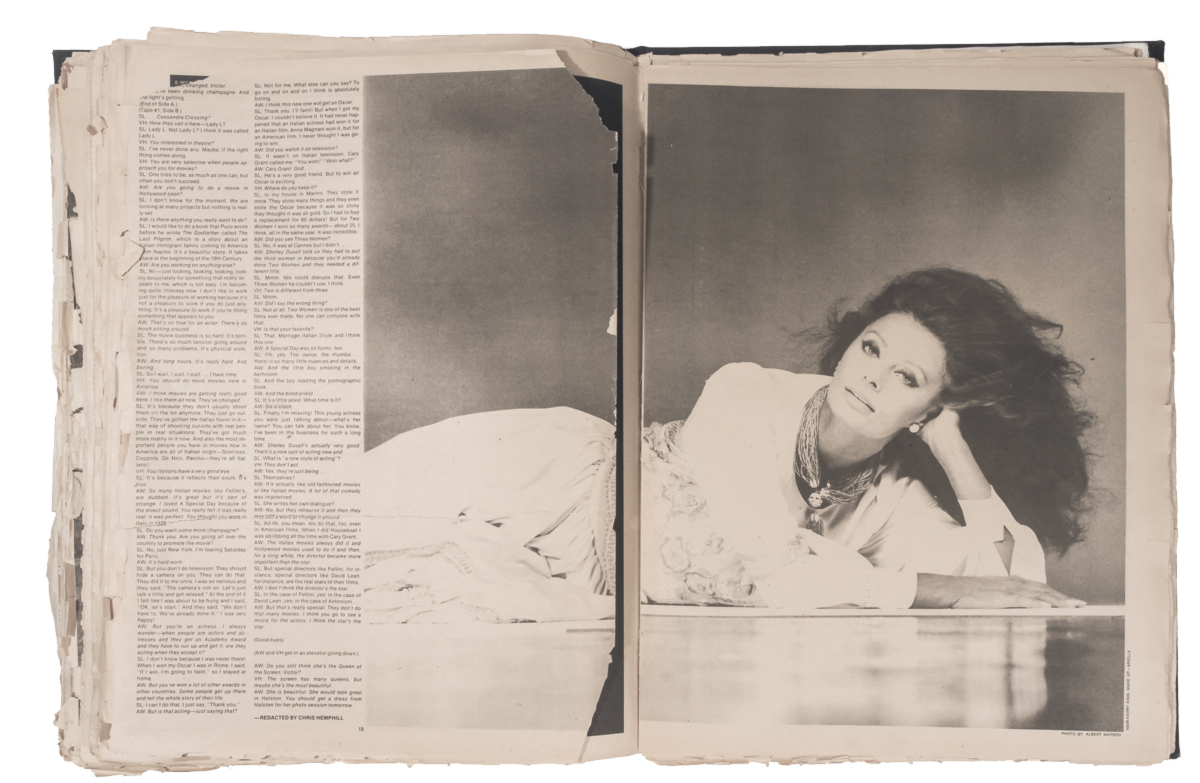
HUGO: You were wonderful. I saw it on the TV the other day.
LOREN: You saw me in Quo Vadis? On TV? I never saw myself in Quo Vadis. What are you talking about?
HUGO: I saw you in a movie before you were a big star. It was one of those Egyptian movies or a Greek movies or…
LOREN: A Greek movie? That was Boy on the Dolphin (1957). But I was the lead with Alan Ladd.
HUGO: You were not the lead. It was a period movie.
LOREN: Then you’re talking about El Cid (1961) or The Fall of the Roman Empire (1964), but I was already a lead then!
HUGO: How is Pier Angeli?
LOREN: She died. She killed herself in Los Angeles about three or four years ago.
HUGO: I didn’t know. We loved her very much in South America. We love all the Italian stars.
(Mina Mazzini)
WARHOL: Did you have to stand in a hole when you played with Alan Ladd?
LOREN: No, I was really very young. I grew much more later!
HUGO: Usually the big stars you see them and they’re not that big. The screen makes them bigger. That’s where is all the fantasy.
LOREN: Then I should be a giant! I don’t look tall on the screen.
WARHOL: No, you don’t but in person you do.
HUGO: In Yesterday, Today and Tomorrow (1963) you look very big.
LOREN: Well, it depends where the camera is. But I am very tall. I’m five foot eight and something and with high heels much more.
HUGO: Also it depends on the clothes.
WARHOL: Oh, I had lunch with Valentino today and he told me to give you a big kiss. I asked him if you wear Valentino’s and he said, “No.”
LOREN: He’s too expensive for me! He’s very expensive. For dresses, especially evening dresses, you only wear one time, two times or even three times, it’s ridiculous. I don’t need clothes. Nowadays it’s not so important to wear so many clothes. It was about 15 years ago. Then I had to look always different. Now I don’t care.
WARHOL: No, I think you should keep it up. When you’re such a big star…
LOREN: Then you buy them for me, my dear, because they’re very, very expensive.
WARHOL: I know, but when you’re really special…
LOREN: Then you help me. But I don’t believe in being a star, anyway.
WARHOL: It’s not just being a star, it’s being special.
LOREN: That’s just what people think.
WARHOL: Actually, you looked beautiful in Boy on the Dolphin in a rag. And you looked beautiful in A Special Day, too.
LOREN: You’re sweet.
WARHOL: How did Mastroianni feel about playing a queer?
HUGO: Is he queer?
WARHOL: No, he plays one.
LOREN: When you hear The Dick Cavett Show it’s very awkward what he says about sex. He said he’s not infallible, he’s fallible. I don’t know if it will go on television. He said, “I’m not a great fucker.” And he insisted on it. I said, “You should excuse him because, not knowing the language very well, he thinks he can say anything in America. He wants to say that he’s not a ‘Love Machine.’ ”
HUGO: He said he’s hot or what?
LOREN: No, he said he’s not. He said he’s fallible, he can fail—he’s not a ‘Latin Love.’ He put it the way he could put it, but with gestures he made himself understood very well!
HUGO: People use that word everyday. Why care?
LOREN: And after this little bit, just to cover up the embarrassment, Dick Cavett said, “Do either of you have any hobbies?”
HUGO: What did you say?
LOREN: Nothing. That was the end of the show.
(Talk shows)
WARHOL: Sixty million people watch Mike Douglas.
HUGO: He’s not as culturated as Dick Cavett, but 60 million people is culturated enough to make money and promote the movie.
LOREN: You always talk about the money!
HUGO: It’s the first time I talk about the money.
LOREN: I think you’re obsessed by it.
HUGO: Andy’s teaching me.
LOREN: He’s an artist. He can’t be.
HUGO: You have to sell art, too.
LOREN: Then you should go on Dick Cavett.
WARHOL: I’m too nervous. When I get nervous I’ll say anything. Or else I’ll say nothing.
LOREN: I get nervous before, but during I rather enjoy it. I’m so glad to know there’s someone more nervous than me.
HUGO: Do people ask you the same question all the time?
LOREN: No, each person is different.
HUGO: But do different people ask you the same question?
LOREN: I understand now but with your accent it’s difficult to know what you’re saying. Sometimes the questions are much more romantic—about my husband, my children…
HUGO: Your children are so pretty.
LOREN: They’re smashing, not pretty. You don’t know my second child.
WARHOL: No, but I saw pictures in the paper. How old is he?
LOREN: He’s beautiful He’s four and a half. The other is eight and a half. They’re both going to school in Paris. We went to live in Paris four years ago when I was making the film with Jean Gabin. My older son went to school for the first time and he like it immensely so I decided to keep him in the same school. That’s how it happened. Then things looks a little bad in Italy and I said, “We better stay here and see what happens.”
HUGO: You have changed in the half hour we are here.
LOREN: How?
WARHOL: Maybe you’ve changed, Victor..
LOREN: We’ve been drinking champagne. And the light’s getting…
(End of Side A)
(Tape #1, Side B)
LOREN:…Cassandra Crossing (1976)?
HUGO: How they call it here—Lady L (1965)?
LOREN: Lady L. Not Lady L? I think it was called Lady L.
HUGO: You interested in theater?
LOREN: I’ve never done any. Maybe, if the right thing comes along.
HUGO: You are very selective when people approach you for movies.
LOREN: One tries to be, as much as one can, but often you don’t succeed.
WARHOL: Are you going to do a movie in Hollywood soon?
LOREN: I don’t know for the moment. We are looking at many projects but nothing is really set.
WARHOL: Is there anything you really want to do?
LOREN: I would like to do a book that [Mario] Puzo wrote before he wrote The Godfather called The Fortunate Pilgrim, which is a story about an Italian immigrant family coming to American from Naples. It’s a beautiful story. It takes place at the beginning of the 19th century.
WARHOL: Are you working on anything else?
LOREN: No—just looking, looking, looking, looking desperately for something that really appeals to me, which is not easy. I’m becoming quite choosey now. I don’t like to work just for the pleasure to work if you do just anything. It’s a pleasure to work if you’re doing something that appeals to you.
WARHOL: That’s so true for an actor. There’s so much sitting around.
LOREN: The movie business is so hard. It’s terrible. There’s so much tension going around and so many problems. It’s physical work, too.
WARHOL: And long hours. It’s really hard. And boring.
LOREN: So I wait, I wait, I wait…I have time.
HUGO: You should do more movies here in America.
WARHOL: I think movies are getting really good here. I like them all now. They’ve changed.
LOREN: It’s because they don’t usually shoot them on the lot anymore. They just go outside. They’ve gotten the Italian flavor in it—that way of shooting outside with real people in real situations. They’ve got much more reality in it now. And also the most important people you have in movies now in America are all of Italian origin—Scorsese, Coppola, De Niro, Pacino—they’re all Italians!
HUGO: You Italians have a very good eye.
LOREN: It’s because it reflects their souls. It’s true.
WARHOL: So many Italian movies, like Fellini’s, are dubbed. It’s great but it’s sort of strange. I loved A Special Day because of the direct sound. You really felt it was really real. It was perfect. You thought you were in Italy in 1938.
LOREN: Do you want some more champagne?
WARHOL: Thank you. Are you going all over the country to promote the movie?
LOREN: No, just New York. I’m leaving Saturday for Paris.
WARHOL: It’s hard work.
LOREN: But you don’t do television. They should hide a camera on you. They can do that. They did it to me once. I was so nervous and they said, “The camera’s not one. Let’s just talk a little and get relaxed.” At the end of it I felt like I was about to be hung and I said, “OK, let’s start.” And they said, “We don’t have to. We’ve already done it.” I was very happy!
WARHOL: But you’re an actress. I always wonder—when people are actors and actresses and they get an Academy Award and they have to run up and get it, are they acting when they accept it?
LOREN: I don’t know because I was never there! When I won my Oscar I was in Rome. I said, “If I win, I’m going to faint,” so I stayed at home.
WARHOL: But you’ve won a lot of other awards in other countries. Some people get up there and tell the whole story of their life.
LOREN: I can’t do that. I just say, “Thank you.”
WARHOL: But is that acting—just saying that?
LOREN: Not for me. What else can you say? To go on and on and on I think is absolutely boring.
WARHOL: I think this new one will get an Oscar.
LOREN: Than you. I’ll faint! But when I got my Oscar, I couldn’t believe it. It had never happened that an Italian actress had won it for an Italian film. Anna Magnani won it, but for an American film. I never thought I was going to win.
WARHOL: Did you watch it on television?
LOREN: It wasn’t on Italian television. Cary Grant called me: “You’ve won!” “Won what?”
WARHOL: Cary Grant, God…
LOREN: He’s a very good friend. But to win an Oscar is exciting.
HUGO: Where do you keep it?
LOREN: In my house in Marino. They stole it once. They stole many things and they even stole the Oscar because it was so shiny they thought it was all gold. So I had to buy a replacement for 60 dollars! But for Two Women (1960) I won so many awards—about 25, I think, all in the same year. It was incredible.
WARHOL: Did you see Three Women?
LOREN: No, it was at Cannes but I didn’t…
WARHOL: Shelley Duvall told us they had to put the third woman in because you’d already done Two Women and they needed a different title.
LOREN: Mmm. We could discuss that. Even Three Women he couldn’t use, I think.
HUGO: Two is different from three.
LOREN: Mmm.
WARHOL: Did I say the wrong thing?
LOREN: Not at all Two Women is one of the best films ever made. No one can compete with that.
HUGO: Is that your favorite?
LOREN: That, Marriage Italian Style (1964), and I think this one.
WARHOL: A Special Day was so funny, too.
LOREN: Oh yes. The dance, the rhumba…there’re so many little nuances and details.
WARHOL: And the little boy smoking in the bathroom…
LOREN: And the boy reading the pornographic book…
WARHOL: And the blind priest…
LOREN: It’s a little jewel. What time is it?
WARHOL: Six o’clock.
LOREN: Finally I’m relaxing! This young actress you were just talking about—what’s her name? You can talk about her. You know, I’ve been in the business for such a long time…
WARHOL: Shelley Duvall’s actually very good. There’s a new sort of acting now and…
LOREN: What is “a new style of acting”?
HUGO: They don’t act.
WARHOL: Yes, they’re just being…
LOREN: Themselves?
WARHOL: It’s actually like old-fashioned movies or like Italian movies. A lot of that comedy was improvised.
LOREN: She writes her own dialogue?
WARHOL: No, but they rehearse it and then they may add a word or change it around.
LOREN: Ad-lib, you mean. We do that, too, even in American films. When I did Houseboat (1958) I was ad-libbing all the time with Cary Grant.
WARHOL: The Italian movies always did it and Hollywood movies used to do it and then, for a long while, the director became more important than the star.
LOREN: But special directors like Fellini, for instance, special directors like David Lean, for instance, are the real stars of their films.
WARHOL: I don’t think the director’s the star.
LOREN: In the case of Fellini, yes; in the case of David Lean, yes; in the case of [Michelangelo] Antonioni…
WARHOL: But that’s really special. They don’t do that many movies. I think you go to see a movie for the actors. I think the star’s the star.
(Good-byes)
(Andy Warhol and Victor Hugo get in an elevator going down.)
WARHOL: Do you still think she’s the Queen of the Screen, Victor?
HUGO: The screen has many queens, but maybe she’s the most beautiful.
WARHOL: She is beautiful. She would look great in Halston. You should get a dress from Halston for her photo session tomorrow.
THIS INTERVIEW ORIGINALLY RAN IN THE NOVEMBER 1977 ISSUE OF INTERVIEW.
———
Read more stories from the Celebrating Warhol collection.



